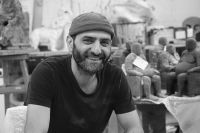
© photo Hazem Waked

BIO :
Khaled Dawwa has participated in several exhibitions in France, Europe and Canada.
In 2015 he presented his first series of sculptures, drawings and bas-reliefs, Compressed, in Marseille and Paris.
In 2017 Khaled was in artistic residency in Saint-Quentin-la-Poterie, in the Gard, and participated at the European Festival of ceramic arts Terralha held in the same town.
In 2018 he began work on a monumental installation, Voici mon cœur, which will be presented at the Cité internationale des arts in 2021.
Acquired by the Fondation Antoine de Galbert with the support of private collectors, the installation was donated to the MUCEM, the sculpture is now part of the museum’s collection.
Several of his pieces are in the Claude and France Lemand Foundation for the collection of the Institut du Monde Arabe (Paris).
In 2019 he has participated in the exhibition Where is the house of my friend? at the Maison des arts de Malakoff. He presented in particular the installation Alliance internationale on the toilets of the art center.
In 2020, the sculpture, Les Passants, commissioned by the Centre d’art contemporain Chanot de Clamart, is installed in the garden of the Centre.
In 2021, his monumental piece Debout! Le Roi des trous occupied the Socle de St Merry in Paris for six months. It is now installed in the Jardin des sculptures de Bois-Guibert in Normandy.
Among the reference texts recently published on the work of Khaled Dawwa, La Destructivité en œuvre, Presses de l’Ifpo (2021) by philosophers Nibras Chehayed and Guillaume de Vaulx, devotes a chapter to him and chooses one of his sculptures for the cover.
Khaled Dawwa graduated from the Damascus School of Fine Arts in 2007 (Syria).
He moved to France in 2014 and opened a studio in Vanves.
His sculptural practice is rooted in the social and political history of his time and in his belief that art has a role to play in it. The Syrian revolution and, more broadly, the upheavals that have affected the world since 2011 have led him to question the relationship between people and power, and between art and memory.
His men of earth and bronze evoke the duality between people and authority, between fragility and solidity. Reduced to impotence by their statufication or pierced by an infinity of holes, these male figures stuck to their seats embody the ambivalence of power.
As Khaled Dawwa says, «the holes, in some of my works, are a way to undermine the solidity of the system, to weaken it. It is my way of expres- sing my frustration with the state of the world around me. I spent hours punching through the statues, both those made of clay and those made of bronze. It is an attempt to pierce the mass, to break the wall.»
K H A L E D
D A W W A
Born in 1985 in Maysaf, Syria.
Leaves and works in Vanves (France).

